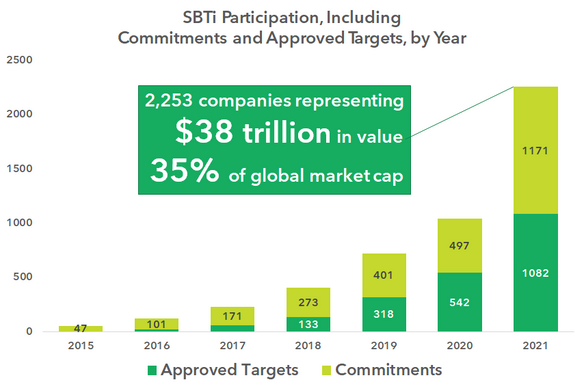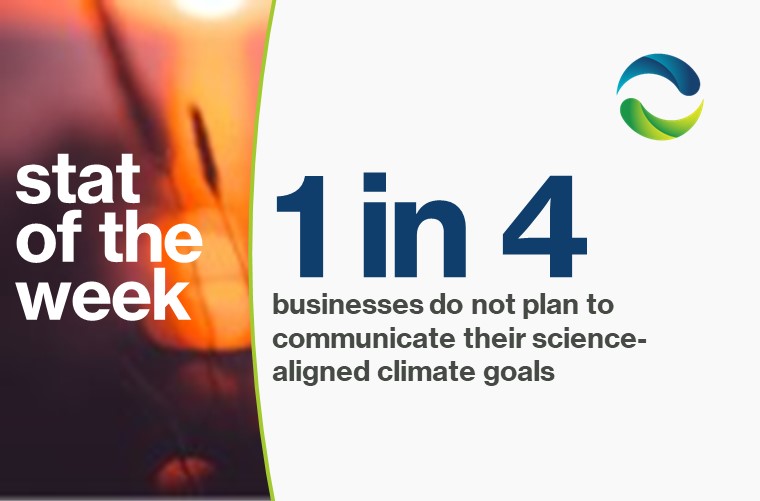On Monday the Science Based Target Initiative (SBTi) released its 2021 Progress Report, which contains a number of encouraging findings about the global economy’s progress on emissions reduction.
Here’s what we at The Climate Board took away from the report.
It won’t be long before participating in SBTi is simply an expectation for large companies. Overall participation in SBTi doubled in 2021, with 2,253 companies now either setting approved targets or formally committing to do so, up from 1,039 in 2020. Commitments aren’t languishing unfulfilled, either; the cumulative number of approved targets in 2021 also nearly doubled. The magnitude of SBTi’s growth is even clearer in economic terms: SBTi members now represent 35% of global market capitalization. $38 trillion in market value is now associated with ambitious climate action and emission reductions. This dramatic growth is a great sign for the planet, and for the emissions-conscious business community. As more companies sign on to SBTi, it will become harder for others to remain on the sidelines, and those who do run the risk of falling behind – not just on the declaration of their goals, but on progress towards them.

Companies with approved targets are outperforming important benchmarks. SBTi-approved companies reduced carbon dioxide-equivalent emissions by 29% between 2015 and 2020. They also have reduced their Scope 1 and 2 emissions since setting their targets by an average of 8.8% per year – more than twice the reduction needed to align with a 1.5°C temperature target. These companies are showing that measurable, meaningful, and sustained emissions reduction is possible. It’s also important to note that SBTi companies are outperforming their non-committed peers. Scope 1 and 2 emissions fell globally in 2020 by 5.6%, largely on account of the COVID-19 pandemic, but companies with approved targets pushed further, reducing their own emissions by 12.1%. It’s very encouraging that these companies did not settle for the “natural” emissions reduction associated with economic calamity, but indeed continued to lead and outperform. A powerful example has now been set for the hundreds of new participants in the SBTi.
Supply chain engagement is still an important missing link for driving emissions reduction through the economy. Scope 3 emissions tend to make up a significant share of a company’s emissions profile, with value chain emissions making up between 65 and 90% of a company’s overall carbon footprint. The small and medium sized-enterprises (SMEs) that make up much of larger companies’ value chains are beginning to play a more significant role in SBTi, as 177 SMEs set targets in 2021, up from only 29 in 2020. But many smaller companies will need support from larger partners to tackle decarbonization. It’s concerning that only 16% of companies have set engagement targets for their supply chains.
Complete and consistent emissions reporting is sorely lacking. SBTi found that in 2021, 28% of member companies had no public information regarding the progress made against their targets. That’s actually more than the 13% of companies not providing information in 2020. Perhaps some leeway can be given to the many new SBTi participants who have yet to build up reporting and disclosure capabilities, but the grace period must be short, especially as mandatory reporting looms in the United States and regulations strengthen worldwide. Transparency is essential to demonstrate progress, shine a light on best practices, and justify further investments.
On balance, we believe SBTi’s findings are news to celebrate, amplify, and reflect on. Corporate climate action is making an impact, and there’s plenty of reason to believe that progress will continue. But it’s always worth remembering that trends and statistics are made of real companies, led by real people, doing real things. Nothing is automatic or inevitable, and those hoping to lead the transition must continue to actively break down barriers to further action.
The Climate Board works with businesses to navigate climate issues and drive rapid progress. No matter where your company is in its climate action journey, we can help. Reach out to our team at info@theclimateboard.com for more information.




